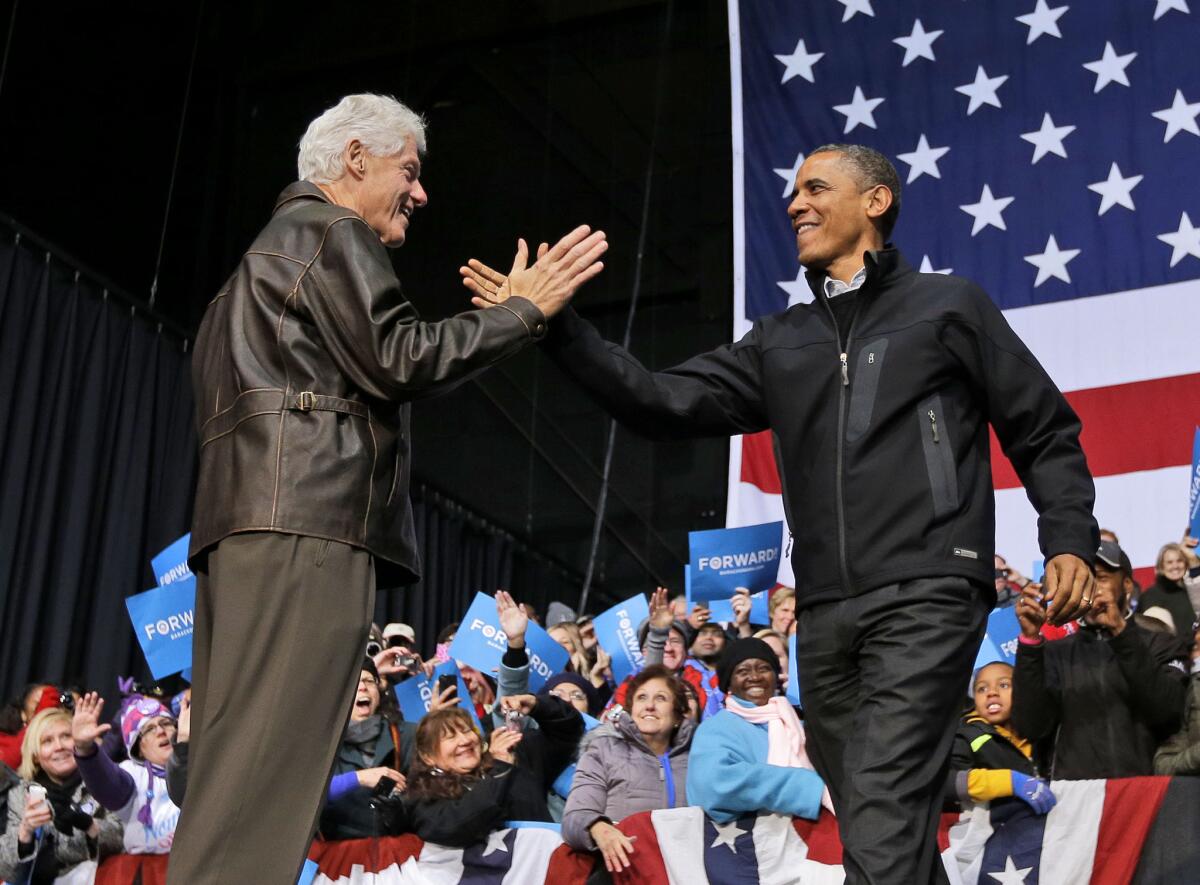Why the poor favor the Democrats

- Share via
Speaking to donors after the election, Mitt Romney attributed his loss to President Obama to the administration’s strategy of “giving a lot of stuff” to blacks and Latinos, citing in particular “free healthcare” and “amnesty for the children of illegals.” But data show a more plausible explanation: Black, Latino and Asian American voters, who overwhelmingly voted for Obama, were simply evaluating the long-term record of each party.
The data we analyzed show unequivocally that minorities fare better under Democratic administrations than under Republican ones. Census data tracking annual changes in income, poverty and unemployment over the last five decades tell a striking story about the relationship between the president’s party and minority well-being.
Under Democratic presidents, the incomes of black families grew by an average of $895 a year, but only by $142 a year under Republicans. Across 26 years of Democratic leadership, unemployment among blacks declined by 7.9%; under 28 years of Republican presidencies, the rate increased by a net of 13.7%. Similarly, the black poverty rate fell by 23.6% under Democratic presidents and rose by 3% under Republicans.
The results for Latinos and Asians, though based on fewer years of data, show the same pattern. For example, Latino incomes grew an average of $627 a year under Democrats and fell by $197 a year under Republicans. The data similarly show that the living standards of Asian Americans have improved under Democrats and stagnated under Republicans.
More important, these gains do not come at the expense of whites. On average, white incomes have similarly grown, and white joblessness and poverty have likewise declined, under Democratic administrations. These numbers show that economic condition need not be a zero-sum game pitting races and ethnicities against one another.
Some might argue that Democrats have been lucky enough to preside during more prosperous times or, indeed, have simply benefited from the long-term results of Republican fiscal policies. In three ways, however, the data suggest that this is not the case, and instead point to a real and substantial partisan divergence.
First, even accounting for the overall state of the economy and other longer-term trends in well-being, partisan differences persist. When controlling for inflation and changes in the gross national product, and accounting for other factors such as oil prices and the proportion of adults in the workforce, we find similarly large gains for minorities under Democrats and equally sharp losses under Republicans.
Second, these partisan trends are remarkably consistent. Black incomes grew in 77% of the years under Democratic control, while black poverty and unemployment declined 88% and 71%, respectively. In sharp contrast, blacks lost more often than not under Republican administrations.
Finally, the longer Democratic administrations are in office, the more they appear to help blacks and other minorities experience economic gains. As Republican presidents stay in office longer, however, the fortunes of minority groups increasingly suffer.
Policy differences between the parties offer many potential explanations for the minority gains. Initiatives intended to boost the incomes and employment of lower-income Americans, such as Lyndon Johnson’s “War on Poverty” or Bill Clinton’s expansion of the earned income tax credit, certainly could play a role. So could more racially targeted efforts, such as the Civil Rights Act and initiatives to expand affirmative action in government hiring.
A range of other policies, such as education and immigration efforts, might especially benefit minority communities. And policies that encourage overall economic and job growth, which Democratic presidents tend to emphasize more than their GOP counterparts, can make a positive difference for minorities — along with everyone else.
Minorities are becoming an increasingly large segment of the electorate. As the Republican Party begins a process of soul-searching to determine why it has such difficulty making inroads among minority populations, it may want to start by looking at the long-range economic effects of its policies.
Zoltan Hajnal, coauthor of “Why Americans Don’t Join the Party: Race, Immigration, and the Failure (of Political Parties) to Engage the Electorate,” is a professor of political science at UC San Diego. Jeremy D. Horowitz is a UC San Diego political science doctoral student.
Zoltan Hajnal, coauthor of “Why Americans Don’t Join the Party: Race, Immigration, and the Failure (of Political Parties) to Engage the Electorate,” is a professor of political science at UC San Diego. Jeremy D. Horowitz is a UC San Diego political science doctoral student.
More to Read
A cure for the common opinion
Get thought-provoking perspectives with our weekly newsletter.
You may occasionally receive promotional content from the Los Angeles Times.










